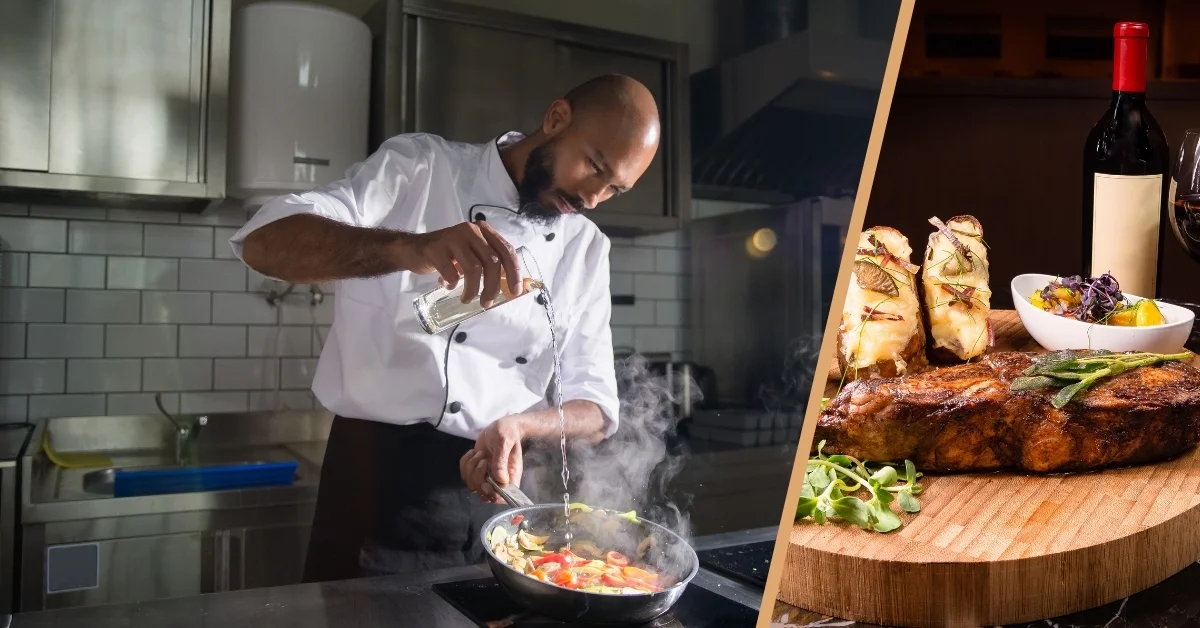When you think about culinary pioneers, Hagie Tunkara Chef stands out as a shining example of talent, innovation, and tradition. Known for blending African heritage with modern cooking techniques, Tunkara is not only a skilled chef but also a cultural ambassador who has brought West African flavors into the global spotlight. From family recipes to Michelin-starred acclaim, his culinary story is both inspiring and groundbreaking.
In this article, we’ll take a deeper look into the life, achievements, and contributions of Chef Hagie Tunkara. We’ll explore his culinary philosophy, innovative techniques, and the impact he’s had on reshaping African cuisine for a global audience.
Who is Hagie Tunkara Chef?
Hagie Tunkara is a Michelin-starred chef who is transforming African cuisine with his imaginative approach to cooking. Born into a family rich with culinary traditions, Tunkara’s roots trace back to West Africa. His upbringing was immersed in the flavors and ingredients that define the region’s food.
Now, he’s recognized as one of the most influential chefs in the fine-dining world, with accolades that span from his Michelin star to international acclaim for his African fusion cuisine. But more than titles, it’s his mission that matters most. Tunkara is driven by the vision of celebrating African culture through food while pushing the boundaries of traditional recipes.
A Culinary Journey Fueled by Passion
Chef Hagie Tunkara’s fascination with cooking began at home. Growing up, he was surrounded by hearty dishes prepared with love cassava, jollof rice, peanut stews, and smoked fish were mainstays in his family kitchen. These early experiences sparked a lifelong passion for food, leading him to pursue formal culinary training.
Tunkara studied at renowned culinary schools, where he mastered fine-dining techniques and contemporary trends. But instead of venturing into the familiar flavors of European or Asian cuisine often dominant in high-end restaurants—he set out to elevate his heritage. He wanted to showcase African flavors in a way that was elegant, refined, and unforgettable.
Hagie Tunk ara’s Approach to African Fusion Cuisine
What sets Hagie Tunkara apart is his ability to fuse traditional African flavors with modern culinary techniques. His mission is clear elevate African cuisine to a global culinary movement while maintaining its authenticity.
Blending Tradition with Innovation
One of Chef Tunkara’s signatures is how he takes traditional African ingredients and contexts but reinterprets them with techniques borrowed from French, Japanese, or molecular gastronomy styles. Take, for example, his deconstructed jollof rice—a dish that retains the essence of the original but delivers it in layers of taste and texture that surprise the palate.
Instead of cooking jollof rice in one pot as is tradition, Tunkara introduces aerated tomato foam, crispy rice chips, and a peanut-infused sauce drizzle. This play on classic recipes grabs the attention of diners and breaks stereotypes about what African food “should” look or taste like.
Focus on Seasonal and Native Ingredients
Tunkara is deeply committed to using fresh, local, and sustainable ingredients. He often sources native African spices, grains, and vegetable ingredients like baobab, fonio, plantain, and tamarind to craft his dishes. These ingredients not only highlight Africa’s natural abundance but they also support agricultural communities in the region.
He’s spoken passionately about making the world see the extraordinary potential of African staples. Through his menus, he showcases the depth and variety of flavors African cuisine offers while earning respect for these ingredients in fine-dining circles.
A Modern Presentation
Part of Tunkara’s appeal lies in his attention to detail when it comes to plating. Each dish he creates is a visual masterpiece vibrant colors, intricate plating, and artistic composition transform his meals into edible works of art.
For Tunkara, the presentation allows him to tell a story. His dishes are not just meals; they’re an experience, weaving the tale of Africa’s rich food history and its modern evolution.
Michelin Star Recognition and Global Acclaim
Securing a Michelin star is one of the highest honors in the restaurant world. It signals exceptional quality, creativity, and consistency. For Chef Hagie Tunkara, this honor represents more than individual achievement it’s a step forward for African cuisine on the global stage.
Breaking New Ground
With his Michelin star, Tunkara has effectively proven that African flavors deserve a prestigious spot in fine dining. His restaurants serve food critics, celebrities, and travelers from around the world, each of them leaving with a newfound respect for African culinary traditions.
It’s not just about the food either. Tunkara’s restaurants often include ambiance and decor influenced by African art and culture. This full immersion ensures that the dining experience feels authentic and emotionally resonant.
An Advocate for Representation
Tunkara has also been a vocal advocate for increasing the representation of African chefs in high-end kitchens. Too often, African gastronomic traditions are overlooked in favor of more mainstream global cuisines. Chef Tunkara views his success as a platform to encourage budding chefs from underrepresented cultures to showcase their heritage with pride.
“I want people to stop associating African food with just street food. It’s so much more,” he stated in a recent interview.
Hosting Pop-Up Events
To give even more people access to his vision, Tunkara frequently hosts pop-up dining events in cities like London, New York, and Paris. Each pop-up introduces unique, seasonal African fusion menus that leave attendees eagerly waiting for his next creation.
These events often sell out quickly and have become a symbol of how impactful Tunkara’s work is in bridging cultures through food.
Influence on the Global Culinary Landscape
Few chefs have managed to impact the perception of a national or regional cuisine the way Hagie Tunkara has with African food. His work has gone beyond just creating delicious meals it challenges the status quo of what fine dining means.
Making African Cuisine Mainstream
Thanks to Tunkara, more restaurants worldwide are incorporating African flavors into their menus. Dishes inspired by his techniques such as fonio risotto, smoked plantain tapas, or tamarind-glazed lamb are starting to appear in eateries that would once have overlooked African influence.
Creating Culinary Collaborations
Chef Tunkara frequently collaborates with other chefs to spread African cuisine further. Through special events, culinary talks, and joint projects, he’s collaborated with Italian pasta experts and Japanese sushi masters, blending these styles with African elements.
Collectively, these collaborations show how flexible and universally beloved African ingredients can be when paired with other global cuisines.
Educational Efforts
Finally, Tunkara invests his time in educating both professional chefs and home cooks about African food. He’s been involved in culinary workshops and online cooking classes and even authored a cookbook that simplifies complex African recipes for the home kitchen.
Whether it’s fonio (a fine grain) or egusi (melon seed paste), Tunkara describes these ingredients in a relatable way, making people curious to explore them.
Why Chef Hagie Tunkara Matters
Chef Hagie Tunkara isn’t just feeding people; he’s feeding minds and changing perceptions. Through his work, he’s bringing diversity to the culinary world while honoring the rich, untapped history of African food. His passion, combined with innovative techniques, has made him an icon not just for African cuisine but for the global food movement.
When you sit at one of his tables, you’re not just eating you’re connecting with a culture, a history, and a vision for the future. This level of artistry and cultural relevance is why Hagie Tunkara’s star continues to rise.
For food lovers all over the world, Chef Tunkara reminds us that even the most traditional recipes aren’t static they can evolve, spark dialogue, and open doors to new possibilities. His story is proof that food truly has no borders.



